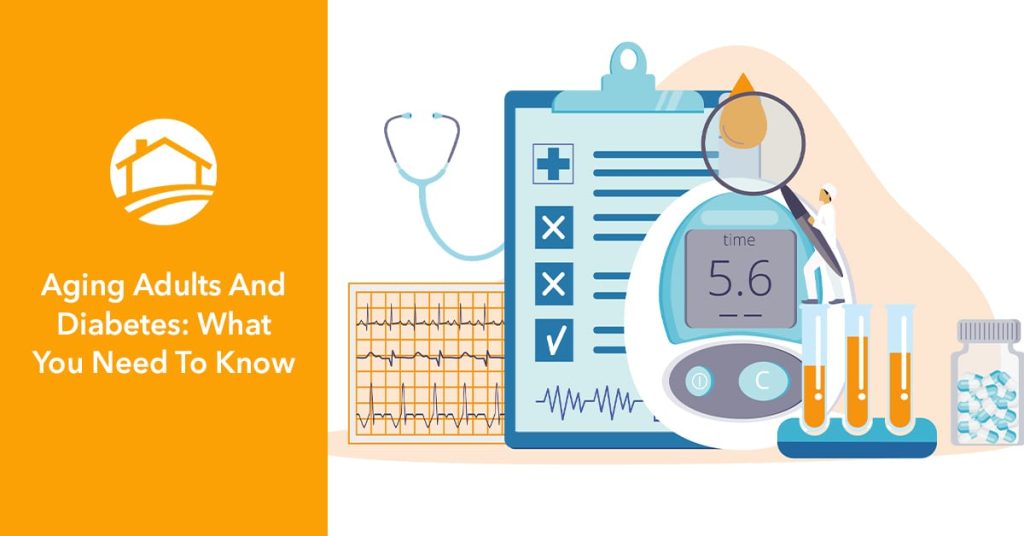Managing Diabetes as Part of Senior Care
Diabetes is a chronic condition that affects the way the body processes food, particularly sugar. Over 25% of adults aged 65 and older deal with some form of diabetes and as such, it is very important to be aware of the symptoms and warning signs. If it is not managed or it is managed improperly, the condition can become very serious, very quickly. Keep reading to learn basic facts about how to prevent and manage diabetes.
Types of Diabetes
There are two types of diabetes, type 1 and type 2. Most often, seniors are affected by type 2 diabetes, however, type 1 diabetes can affect seniors as well.
Type 1 Diabetes
- Chronic
- Unpreventable
- Diagnosed with a blood test
- Managed through regular blood sugar tests
- May require regular insulin injections or a pump
Type 2 Diabetes
- Chronic
- Sometimes preventable
- Diagnosed with a blood test
- Managed through periodic blood sugar tests
- Often manageable by lifestyle and diet changes; may require medication
For seniors with type 1 diabetes, continue care as normal. Caregivers should be on the lookout for symptoms of hypoglycemia and be sure to help seniors monitor their disease as common consequences of aging, like memory loss or lack of routine, increase the difficulty of managing diabetes symptoms.
Seniors With Type 2 Diabetes
Symptoms:
- Feeling tired
- Being unusually hungry or thirsty
- Accidental weight loss
- Frequent urination
- Blurred vision
- Skin infections
- Slow healing from cuts and bruises
Type 2 Diabetes Management:
- See a dietician to help you plan meals within a healthier diet
- Get regular exercise (personal training is often discounted for seniors)
- Track your glucose levels with periodic blood tests as directed by your physician
- Lose weight if obesity is contributing to the disease
- Choose a healthy lifestyle to decrease risks associated with diabetes (stop smoking, get plenty of sleep, attend annual physical exams)
Medical Tests:
Blood tests can diagnose diabetes and sometimes even show signs of prediabetes. Seniors should always be screened for diabetes at annual appointments and request blood tests from their doctor if symptoms do develop.
In some cases, medication is a part of type 2 diabetes management. Ask your doctor if any medications could be helpful in preventing type 2 diabetes symptoms from becoming worse. Make sure your caregiving team is in sync concerning your diabetes care to keep your blood sugar levels normal and healthy.
Type 2 Diabetes Prevention:
Many people can lower their risk of type 2 diabetes by making lifestyle changes such as:
- Losing weight
- Getting regular exercise
- Eating a healthy diet
- Taking prescriptions as directed by a doctor
Seniors who have been told they have prediabetes should take prevention very seriously, as prediabetes predisposes them to develop the disease.
Type 2 Diabetes Risk Factors
Seniors are at a greater risk of type 2 diabetes if they:
- Are over 65 years old
- Are overweight
- Have a family history of diabetes
- Are sedentary
- Had gestational diabetes while pregnant
Home Care Tip:
Being diagnosed with type 2 diabetes can be discouraging for seniors. The risks of poorly managed diabetes are serious: some people even require amputations! Be supportive and understanding. Find a support group or classes about type 2 diabetes to help seniors stay positive and make healthy choices.
- Public Health in the Age of COVID - September 15, 2021
- World Elder Abuse Day June 15, 2021 - June 28, 2021
- World Elder Abuse Day - June 15, 2021




